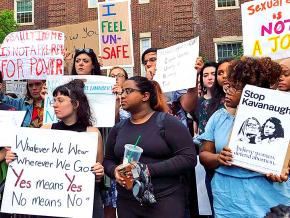Protesting a sexist professor at Brooklyn College
, a Brooklyn College student and editorial board member of the Excelsior newspaper, reports on protests against a business professor’s outrageous blog post.
“IF SOMEONE did not commit sexual assault in high school, then he is not a member of the male sex.”
On September 27, Brooklyn College business professor Mitchell Langbert posted that message on his blog in response to the sexual assault allegations against Supreme Court nominee Brett Kavanaugh. Langbert’s post continued, “In the future, having committed sexual assault in high school ought to be a prerequisite for all appointments, judicial and political.”
The blog post was discovered on October 2 when a student posted screenshots to a Facebook page called Brooklyn College: In the Know 2 for students and alumni of the college. Student organizations like the International Socialist Organization-Brooklyn College, Young Progressives of America, Student Liberation Action Movement and the LGBTQ Resource Center came together to organize a protest.

The activists came up with list of demands that included an investigation and termination in accordance with the investigation, a public statement from college President Michelle Anderson and the head of the Business Department, anti-sexual assault training for all faculty, the opportunity for students enrolled in Langbert’s class to drop or swap without academic or financial penalty, and a campus forum to address sexual assault on campus.
A week after the post went up, one of the largest student-led protests was held on campus. Around 300 students gathered in front of Brooklyn College’s iconic library and called for Langbert’s termination. After their demands were read, protesters promised to continue protesting until they were all met.
Langbert’s misogynist comments came in the midst of a heated fight surrounding the nomination of Kavanaugh, who has been credibly accused of sexual assault by multiple women, and at the height of the #MeToo movement that has renewed the fight against sexual violence and harassment.
The same outrage that mobilized women-led demonstrations around the country against Kavanaugh has helped to move activists on Brooklyn College’s campus in resistance to the normalization and, even incitement, of sexual assault by a professor in a country where one in five women attending college experience sexual violence.
THE DAY before the protest, Brooklyn College Provost Anne Lopes issued a statement:
I view the post as offensive, obviously abhorrent, and contravening the fundamental values and practices of our community. However, the First Amendment to the United States Constitution protects even speech that many experience as offensive, such as the faculty member’s post.
Students found this response to be insufficient and even insulting. Many were quick to point out that the First Amendment does not protect individuals from losing their jobs. Protesters emphasized that what Langbert said wasn’t a political view — it was a call to violence.
At the protest, Daphna Thier, a Brooklyn College student and member of the socialist club on campus, said that by advocating for young men to behave like Kavanaugh, Langbert “has put at risk students and all members of the campus community. This is tantamount to incitement. It should be obvious that publicly stated support of rape and sexual violence isn’t a legitimate or acceptable political viewpoint.”
Langbert initially stood by his claims. In a New York Post interview, he stated, “It is natural for males to be sexually exploratory.” He continued, “As long as there is no coercion or violence, it’s not a crime.”
But as pressure grew, Langbert changed his blog to indicate that his statements were satire and proclaimed to the media that his blog was misinterpreted by students — that this was all a misunderstanding. “I was trying to be satirical,” Langbert said, “but I guess I’m no Jonathan Swift.”
Langbert also cast himself as the victim of thought police. “The way universities operate now are more like Southern lynch mobs of the early 20th century,” he told the New York Times. “Basically that’s what I’m experiencing here.”
While Langbert attempts to position himself as a victim of persecution, students have highlighted that it is the women on campus who suffer harm from his statements that threaten their right to a safe learning environment.
Brooklyn College President Michelle Anderson, who remained silent after the controversy hit, finally responded after the protest. She delivered on some of the demands — an on-campus speak-out event and allowing students enrolled in Langbert’s class to swap sections — and she condemned Langbert’s words.
But activists are keeping their promise to continue demonstrating until all their demands are met. On October 9, there will be a Faculty Council meeting, and students are organizing to sit-in and hold signs reminding Anderson of their remaining demands.


